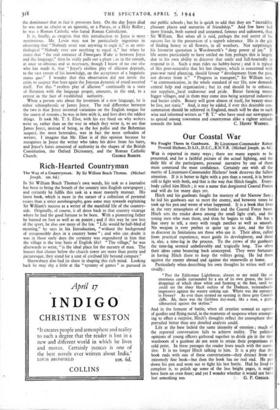Our Coastal War
We Fought Them in Gunboats. By Lieutenant-Commander Robert Peverell Hichens, D. S.O., D.S.C., R.N.V.R. (Michael Joseph. 9s. 6d.) WAR is reported in many ways ; there are many aspects to be presented, and for a faithful picture of the actual fighting, and the daily life of the participants, personal narrative by one of them must command the most confidence. Certainly one with all the merits of Lieutenant-Commander Hichens' book deserves the fullest attention. If it is better to fight with a pen than a sword, it is better still to fight with both, and that is the way that Hitch fought. Every- body called him Hitch ; it was a name that donlinated Coastal Forces and will do for many days yet.
Hitch and his gunboats fought for mastery of the Narrow Seas ; he led his gunboats out to meet the enemy, and between times he took up his pen and wrote of what happened. It is a book that lives in the very atmosphere of the battles and the Coastal Force bases. Hitch sets the reader down among the small light craft, and the young men who man them, and then he begins to talk. He has a fine story to tell, a story with rough patches as well as smooth. No weapon is ever perfect or quite up to date, and the first to discover its limitations are those who use it. Their ideas, culled from practical experience, must guide its development, and there is, alas, a time-lag in the process. To the crews of the gunboats the time-lag seemed unbelievably and tragically long. Too often their ideas came bouncing back unaccepted. They were fortunate in having Hitch there to keep the volleys going. He led them against the enemy abroad and against the stonewalls at home.
Particularly when describing his own thoughts he writes well and vividly:
" Past the Eddystone Lighthouse, always- to my mind like an enormous candle surrounded by a sea of its own grease, the latest droppings of which show white and foaming at the foot, until we could see the sheer black outline of the Dodman, tremendously impressive against the watery sinking sun. Where was the entrance to Fowey? As ever there seemed no opening in those grey Cornish cliffs. Ah, there was the Gribben day-mark, like a man, a giant, silhouetted against the skyline."
And in the ferment of battle, when all creation seemed an uproar of gunfire and flying metal, in the moments of suspense when attempt- ing to effect a surprise, Hitch's thoughts reflect the atmosphere that prevailed better than any detailed analysis could. Life at the base lacked the same intensity of emotion ; much of the reported conversation fails to achieve reality. The political opinions of young officers gathered together to drink gin in the tiny wardroom of a gunboat do not seem to retain their proportions in cold print. In these passages the reader loses touch with the narra- tive. It is no longer Hitch talking to him. It is a pity that the book ends with one of these conversations—they detract from an extremely fine book—but then the book has no real end. He put down his pen and went out to fight his last battle. Had he lived t) complete it, to polish up some of the less bright pages, it migl-t have been an even finer; and yet I wonder whether it would not has


























 Previous page
Previous page